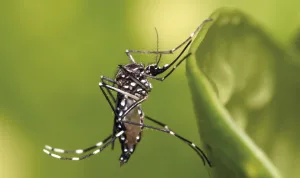The World Bank, in collaboration with the Climate Investment Funds (CIF) and the Climate Support Facility (CSF), has issued a stark warning about the role of climate change in the spread of vector-borne diseases (VBDs) in Pakistan. As the country grapples with numerous health challenges, a recent report titled “Climate and Health Vulnerability Assessment of Pakistan” sheds light on how changing climate patterns are fueling the rise of diseases like dengue, malaria, and Zika.
Climate Change and Vector-Borne Diseases
According to the report, Pakistan is one of the countries most vulnerable to climate change, with dengue emerging as the fastest-growing arboviral threat. Between 1995 and 2019, dengue cases increased by an astonishing 800 times, and the risk of transmission continues to rise due to environmental changes, urbanization, and population growth.
The World Bank report reveals that over 62 million people in Pakistan are currently at risk of contracting dengue, with Punjab and Islamabad being the most vulnerable regions. Nearly 54% of Punjab and 80% of Islamabad’s land area are suitable for the breeding of the dengue-carrying Aedes aegypti mosquito. The situation is expected to worsen, with more areas becoming suitable for dengue transmission by the 2030s and 2050s.
The same mosquito species responsible for dengue also transmits Zika and yellow fever, both of which could pose future threats to Pakistan, particularly as climate change accelerates and infrastructural changes increase connectivity with neighboring endemic countries like India and China.
Rising Malaria Threat
Malaria also remains a significant concern in Pakistan, affecting over 60 million people in high-risk areas and nearly 50 million in low-to-medium risk zones. The report identifies Sindh as one of the regions with the highest malaria cases, though Punjab also bears a heavy burden. In Punjab, 56% of the region is suitable for malaria vectors, putting more than 70 million people at risk. Projections indicate that malaria transmission risks will continue to shift with climate change, with variations across different regions through 2050.
Waterborne Diseases on the Rise
In addition to vector-borne diseases, Pakistan faces a significant burden from waterborne diseases (WBDs). Contaminated water sources, inadequate sanitation, and poor hygiene practices have contributed to high rates of morbidity and mortality, particularly among children under five. Diarrheal diseases, for example, were the fourth-leading cause of death in Pakistan in 2019.
Only 20% of the population in Pakistan has access to safe drinking water, and 30% of diseases in the country are linked to polluted water. The report warns that climate change, through increasing temperatures and more frequent flooding, will further degrade water quality, leading to a surge in diseases like cholera, typhoid, and hepatitis. Regions along the Indus River are particularly vulnerable to these risks due to glacial melting and extreme weather events.
Urgent Need for Action
While climate change is a major driver of the spread of vector-borne and waterborne diseases, the report stresses that environmental, social, and economic factors also play a critical role. The increased connectivity facilitated by infrastructure projects such as the China-Pakistan Economic Corridor (CPEC) could accelerate the spread of diseases like Zika and yellow fever, which are already endemic in neighboring countries.
The World Bank report calls for immediate action to mitigate the impact of climate change on public health in Pakistan. This includes improving water sanitation, enhancing healthcare infrastructure, and raising public awareness about preventative measures to combat the rise of these diseases.
Pakistan’s vulnerability to climate change and its effects on public health cannot be overstated. With the population at risk increasing every year, it is crucial for the government, healthcare providers, and communities to work together to protect the health and well-being of millions.
ClimateChange #VectorBorneDiseases #DengueOutbreak #MalariaThreat #ZikaVirus #PakistanHealth #WaterborneDiseases #WorldBank #PublicHealth #SafeDrinkingWater




+ There are no comments
Add yours